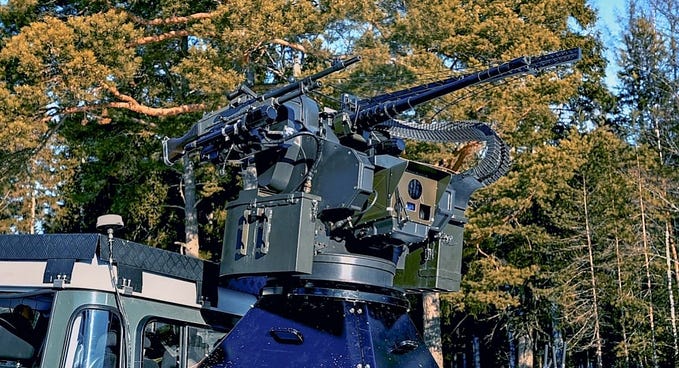The Ukraine War Triggers The Next Recession
It Could Also Set Off A Global Famine. Time To Stock Up On Food And Other Things.

The war in Ukraine will have severe global consequences over the coming months and years. In this article, I will give you a quick rundown of what is likely to happen and how you should prepare for it.
Note: I am writing this from the perspective of a resident of a wealthy European country. Some of my conclusions may not or only partially apply depending on your location.
A Quick Recap
We are in a difficult situation. Even before the pandemic, when everything seemed fine, the global economy was in a much worse position than official sources and the media were telling us.
The short form: Globally we are running out of high-density energy sources (fossil fuels). Switching to alternatives turns out to be highly complex and cannot compensate for the existing shortage. Because increasing amounts of energy have to be used to extract and produce more energy, economic growth in the energy-intensive economies of the West has stagnated for decades. Governments try to stimulate the economy by injecting ever-increasing amounts of money into the system.
It doesn’t work.
Read more on the how and why here.
In fact, the global economy has been trending downwards since 2018. The pandemic made things worse. And now there is a war in Ukraine.
I’m not going to talk about politics here. But I will tell you what problems I see to come.

The Ukraine War Will Trigger The Next Recession
If you take a look at commodity prices these days then they will tell you a story. And that story is that a recession is coming.
Prices are exploding.
Wait. Why do I say that a recession (which is deflationary) is coming when prices are going up?
I see the following sequence play out.
Inflation — Crash/Recession — Inflation
We are now in the middle of the first inflationary phase.
Energy prices have already been a problem, even if we haven’t felt the effects directly for a long time. Added to this were supply bottlenecks, which drove up prices. The war in Ukraine further accelerates these underlying factors for price increases. This is because Ukraine and Russia are producers of many important things that the global economy needs to function.
A major factor is energy.
As mentioned above, we (especially western industrialized countries) need cheap high-density energy to maintain our overly-complex systems. Russia is one of the major producers of oil and gas.

So why is the war pushing energy prices higher?
Because in the coming months Russia will be unable to supply the world with the same output of fossil fuels as it did until now. That’s because
- sanctions and economic disruptions reduce production
- some western countries will or plan to stop imports of Russian oil and gas
- Russia (maybe) will stop exporting energy to western countries
It’s hard to estimate how things will play out exactly. But I think there is a high chance that Russia’s production and transport capabilities will be significantly smaller in the coming months and years than until a few weeks ago.
And this is reflected in prices.
But why will increasing energy prices cause a recession?
Because the last time when oil prices were this high was just before the great financial crisis of 2008/09 set in. High oil prices crush the economy.
They push up prices for everything else, be it industrial production, transport, or agricultural production.
But there is more.
The Stage For A Global Famine Is Set
I hope that I am wrong about this. But I see a global food crisis coming.
Here’s why.
Russia and Ukraine are some of the largest producers and exporters of wheat and other agricultural products. Because of the war, Ukraine can’t start its planting season in March and April. And there won’t be a harvest in Autumn. Due to the crisis, Ukraine’s and Russia’s ports in the black sea are closed. On top of that, Russia might not want to export agricultural products to Europe and/or the West might not want to buy it.
So we have reduced production and reduced transport capabilities for two important producers of agricultural goods. For a lot of countries in Africa, the Middle East, and Europe who import a lot of their food from this region this is a big problem.
Lack of food was what caused the Arab Spring.
All of these countries will try to buy the food they need from somewhere else. But if two of the largest producers of wheat suddenly fail completely or partially, you cannot simply replace them 1:1.
That’s why prices will go much higher.
But that is not all.

Russia also is the world’s largest producer of fertilizer (also a very energy intensive process). If they stop export it will have a global impact because food production from Iowa to India will become more expensive and potentially unstable.
What All Of This Means For You
Let’s summarize.
- In the short to middle-term, we have rising energy prices push up prices for everything else leading to double-digit inflation in many places, including food. Due to the war, Russia and Ukraine will not be able to supply the world with the same amount of agricultural products.
- This will go on until a point is reached where energy prices will be so high that the global economy breaks. A deflationary crash will happen. Prices for everything (stocks, property, goods) will go down as global demand collapses.
- This will destroy a lot of businesses and many people will lose their jobs.
- Demand will return at some point. However, underlying problems won’t go away as shortages in fossil fuels persist. So in the middle to long-term prices for all goods and services will go up again.
If you want to read more about what this means in the long-term, here’s another article which you should check out.
But what about the coming months?
As I said above, I worry about a global food crisis. So depending on your country’s or region’s exposure to the factors I just described, my advice is to stock up on non-perishable food and water. Just in case.
If my prediction is wrong you won’t have lost anything as you can just use up the goods you bought as you normally would. But if the worst-case scenario (shortages, very high prices) takes place you will be happy to have put something to the side.
Take care!
For more articles I wrote on economics and inflation, please check out my list:
https://ren-heinrich.medium.com/list/economics-and-inflation-9eb971c3da2e





